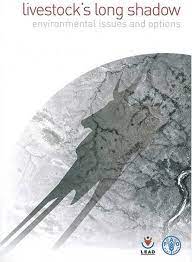Revisiting Livestock’s Long Shadow
By Jeanne Yacoubou, MS
In 2006, the Food & Agriculture Organization (FAO) of the United Nations (UN) published its landmark report titled Livestock’s Long Shadow: Environmental Issues and Options. This Report, written like a life cycle assessment (LCA) of animal food products, raised public awareness about the environmental effects of the livestock industry. Going beyond water and air pollution, the Report described the link between accelerated global warming caused by methane emissions from cattle.
The Report has also been called a bombshell, shining light on an industry whose production of meat and milk products had not yet been widely recognized as a significant contributor to climate breakdown.
Some of the Report’s conclusions about animal agriculture’s role in anthropogenic (human-caused) climate crisis detail just how significant that contribution is:
- 18% of global greenhouse gas (GHG) emissions
- 37% of methane emissions
- 65% of nitrous oxide emissions
- 64% of ammonia emissions
We’ve addressed all of these emissions separately by type in recent articles, beginning with our piece on the carbon footprints of pizza.
In our 2009 article on the FAO Report, we noted that there was little reference to vegetarianism or veganism as a solution to the environmental problems caused by animal agriculture. There certainly was no advocacy for any type of plant-based diet as a strategy to reduce, let alone eliminate, the environmental impact – such as water pollution – of the livestock industry. This was before carbon emissions from food production became the subject of intense research as it is now.
It seemed obvious to us, then and now, that to lessen the environmental degradation caused by confined animal feeding operations (CAFOs), the livestock industry needed to change its ways or, better yet, be replaced.
Recently, our suspicions about why the FAO Report didn’t enthusiastically embrace vegetarianism or veganism have been confirmed. Several former FAO officials involved with the project stated anonymously to a major newspaper in October 2023 that the livestock industry exerted a strong influence on the Report. Industry lobbyists censored language that would present their practices as environmentally destructive. Since they wanted to keep selling their products, they’d never agree to a vegetarian or vegan alternative to meat eating.
Likely due to continued pressure by the animal agriculture industry to diminish livestock’s contribution to climate breakdown, the FAO revised its 18% figure from 2006 to 14.5% in 2013 in a report titled Tackling Climate Change Through Livestock. The title itself reflects the move away from placing responsibility on the livestock industry to implying it offers a way to solve the climate crisis.
Interestingly, the FAO will present at the November 2023 Conference of the Parties (COP), the first time agriculture’s contribution to the climate emergency will be highlighted at an international climate meeting. Reportedly, they will propose ways agriculture can help keep global heating to below 1.5 degrees Celsius above pre-industrial levels. Meanwhile, climate scientists are now reporting that current emissions will easily surpass that benchmark by 2040 if not sooner.
At the meeting, FAO will supposedly lower its GHG percentage further to 11.2%. It’s not clear how this is possible given recent increases in meat production.
The take home message from this revelation is something we’ve seen before and will, unfortunately, probably see again. Researchers are beginning to document how the livestock industry influences public perceptions on its role in causing the climate crisis. Their strategy is analogous to how the fossil fuel industry, through costly public relations campaigns, sows climate doubt and denial in the U.S. as it has for over fifty years.
This is another reason why the work of independent nonprofit organizations, such as The Vegetarian Resource Group, is more important than ever. To join VRG, go to https://www.vrg.org/member/2013sv.php

